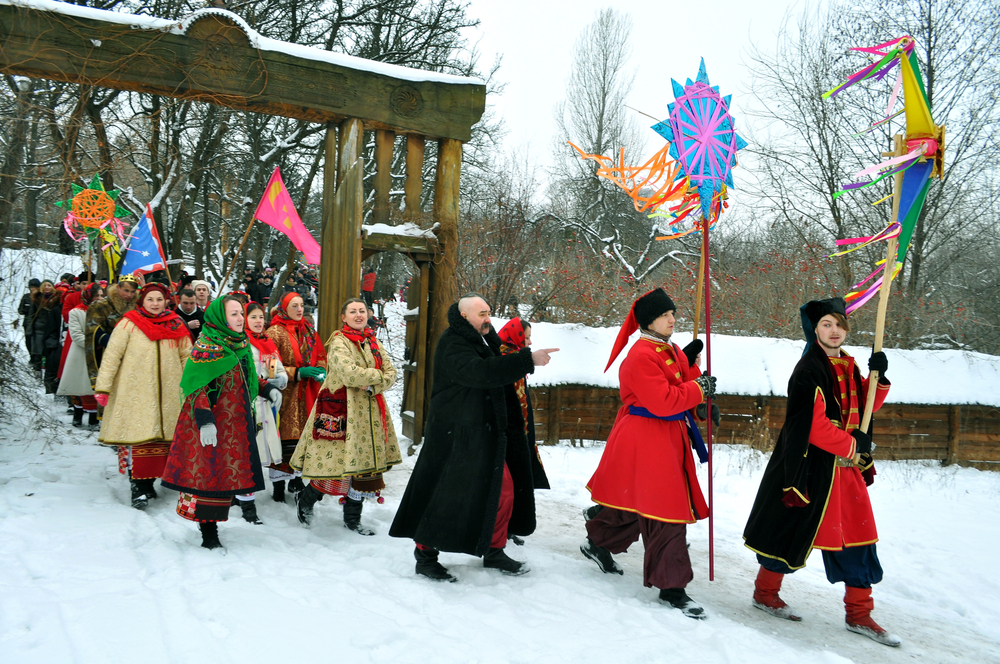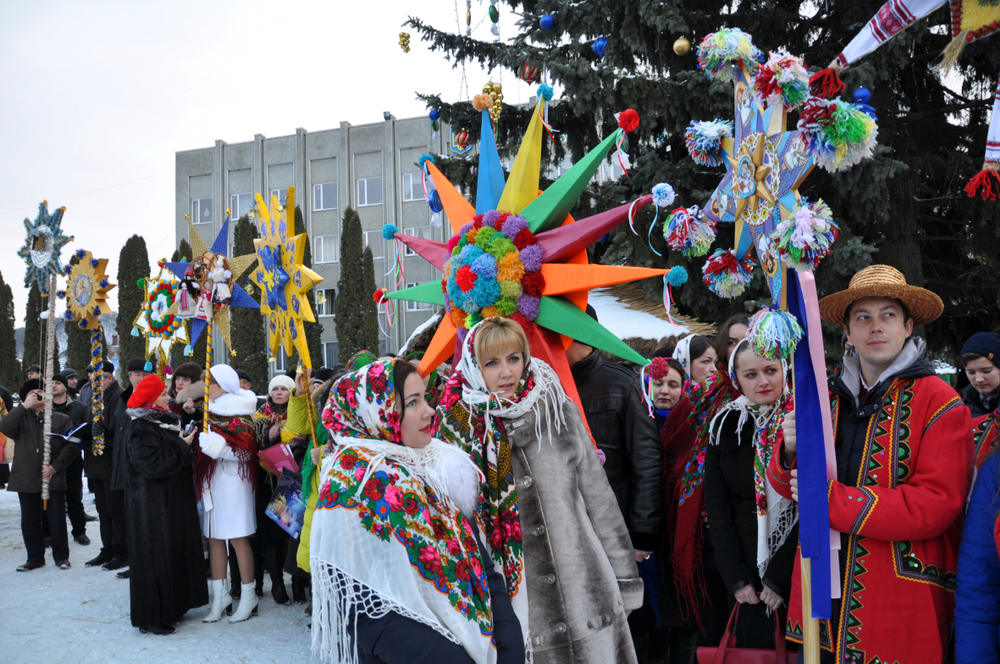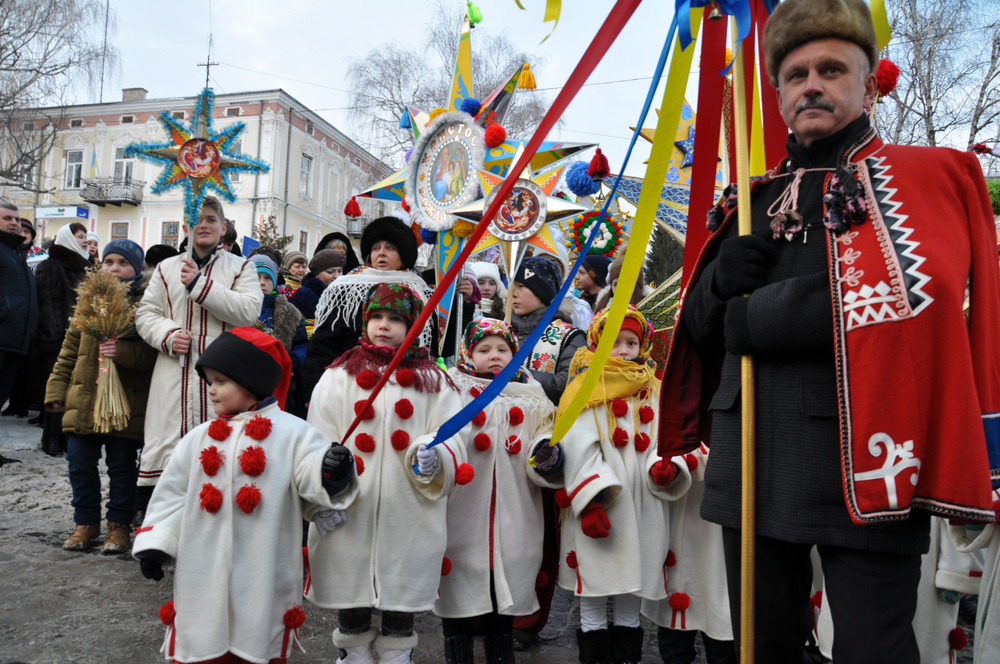The most popular version about the origin of Ukrainian Christmas carols` name “kolyadky” is the relation of this word to Romanian name of New Year – “calendae januarine”, which literally means “the beginning of January”.
In the ancient times, kolyadky were ritual pagan songs related to the winter cycle, the birth of the new Sun and honoring of ancestors. Traditionally, people sang kolyadky on the holiday of Winter Solstice (“Kolyada”) on December 21. After Kyiv Rus was Christianized in 988, Orthodox Church started to extirpate old Pagan traditions, but it was very hard to make people forget the beliefs of many generations at short notice. That`s why it was decided to unite some Pagan holidays with appropriate Christian celebrations. In this way, Kolyada holiday merged with Orthodox Christmas. 
Read: Ukrainian Traditional Christmas Ornaments and Decorations
Since kolyadky turned into Ukrainian Christmas songs, many of them acquired new religious meaning. Kolyadky with Biblical motifs about Jesus Christ, Virgin Mary and Three Wise Men became very popular among Ukrainians. However, it was almost impossible to distinguish kolyadky into folk and religious ones – the patterns of both traditions interacted and combined in the most unusual ways. Though, there are particular signature church Christmas carols, and even some kolyadky with foreign origins. 
In Christmas Eve, people singing Christmas songs (“kolyadnyky”) traditionally walk from home to home, bringing golden Bethlehem star with a light. Often, especially in the Western regions of the country, kolyadnyky dress as a Goat (Ukrainian traditional symbol of wellness and wealth) or in costumes of Biblical characters, and play different scenes. The whole process of singing Christmas songs and playing Biblical scenes is called “kolyaduvannya”. In different regions of the country, kolyaduvannya took place in various days: on Christmas Eve, on the next day or even two days after Christmas.
Christmas carols in Ukrainian villages were usually performed by groups formed separately of young girls, young men or children. Depending on gender and age of particular group members, melody, rhythm and even lyrics of carols could vary. For example, Christmas songs for kids are simplified – it is often just a congratulation and an ask for a reward. 
Read: Slavic Pagan Traditions for the New Year Eve
According to traditions, girls who sang Christmas carols did not walk into the house, while men were allowed to step in for a short time. The young men sang songs near holy icons, took a seat at the table, then bowed to the hosts and continued their way to the next home. The hosts always greeted singers with great joy and gratitude, presenting them sweets and money and inviting them to enjoy meals at festive dinner. The singers usually kept sweets for themselves, while money was provided by them to the Church.
“Dobry vechir tobi, pane gospodaryu”! (“Good evening, host”!) is the most popular among all Christmas songs in Ukrainian language. The lyrics of this song include congratulations with the birth of Jesus Christ and invite everyone to celebration.
“Nova radist` stala” (“New joy has come”)
This is one of the most lovely Ukrainian Christian Christmas songs. It combines the best elements of religious and folk carols, telling about the joy of people related to the new-born hope for peaceful and happy life.
“Tykha nich, svyata nich…” (“Silent night, holy night”)
This is one of the world-wide appreciated Christmas songs. Ukrainian variant of the song is very beautiful, but the real authors of this composition lived in Austria. The text of kolyadka “Tykha nich, svyata nich…” was written in 1818 by Joseph Mohr, and music was composed by organ player Franz Gruber.
“Po vsiomu svitu stala novyna” (“The news has got around the whole world”) is one more great song from popular Ukrainian Christmas carols.
After 70-year regime of atheist Soviet government, the folk and religious traditions began to revive step by step. Christmas became an official state holiday, and nowadays Christmas carols sound at homes, in kindergartens and schools. In Christmas time, we can meet young people in folk costumes holding Bethlehem star, singing about new-born Jesus and wishing people goodness, wealth and merry holidays.
Photo source: shutterstock.com. All photos belong to their rightful owners.
Ukrainian Christmas Songs/Lyrics
Traditional Ukrainian Christmas carols, usually called “kolyadky”, are an integral part of Christmas celebration on the whole territory of Ukraine. These merry songs are sung during the ritual action called “kolyaduvannya” that takes place on January 6 – the Christmas Eve. Let`s learn more about Ukrainian Christmas songs/lyrics and Christmas customs in Ukraine.







